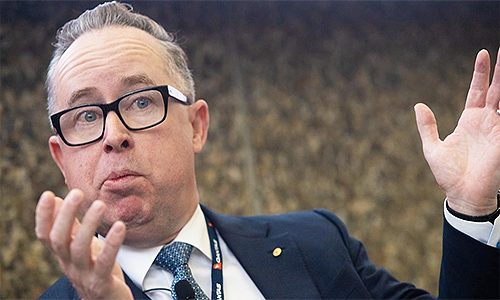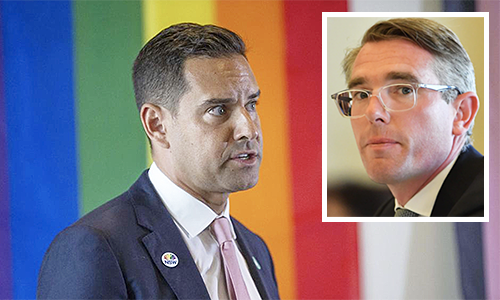
DUTCH PM Mark Rutte has told Hungary it had “no business being in the European Union anymore” after it banned the promotion of homosexuality to children.
Mr Rutte’s outburst followed the Hungarian parliament’s adoption of legislation that bans the depiction or promotion of homosexuality among children younger than 18 years of age.

- The European Union Treaty does not say anything about the 'expulsion' of a member State.
- Rutte’s outburst indicates the frustration felt in the EU about Hungary’s legislative record.
- Hungary is holding firm to its Christian values while watching western Europe decay.
Hungarian Prime Minister Viktor Orban explained that the law, passed on June 15, does not target homosexuality, but instead protects the rights of children and their parents.
The exchange highlights the ongoing schism within the European Union that has been brewing in recent years.
Despite protests from Mr Rutte and 16 other European leaders, Mr Orban’s position may in fact be supported by Article 34 of the United Nations Convention on the Rights of the Child, which was ratified by Hungary in 1991.
EXPLOITATION
This Article imposes an obligation on nation states to protect the child from “all forms of sexual exploitation and sexual abuse” and to achieve this they should take “all appropriate … measures to prevent … (c) The exploitative use of children in pornographic performances and materials”.
However, Mr Orban’s detractors claim that the legislation deprives vulnerable young people of needed support and is disrespectful of the LGBTQ community.
From a legal point of view, Mr Rutte’s comment is noteworthy because it raises the question of how the European Union can expel one of its members.
Yet, the European Union Treaty does not say anything about the “expulsion” of a member State. Instead, it provides a procedure for “suspending” the rights of an existing member.
Article 7 (1) of the Treaty on European Union (TEU) states that four-fifths of all member States, after obtaining “the consent of the European parliament, may determine that there is a clear risk of serious breach by a member State of the values referred to in Article 2,” of the Treaty.
The values listed in Article 2 underpin the union, and usually need to be honoured by prospective countries wishing to join the bloc.
It states that: “The union is founded on the values of respect for human dignity, freedom, democracy, equality, the rule of law and respect for human rights, including the rights of persons belonging to minorities”.
An obvious problem is the perceived or real vagueness of the language of Article 2. The concepts of human dignity, freedom, democracy and equality are empty vessels, the meaning of which must be filled in by politicians and occasionally, by activist judges. They are words that notoriously mean what interpreters want them to mean.
By virtue of Article 7 (2) of the TEU, the European Council – which is made up of the heads of state of each nation – may determine the existence of a “serious and persistent breach of a member State of the values.”
SUSPENSION
If a determination of a breach were made, the Union, in accordance with Article 7 (3) may decide to suspend certain rights deriving from the treaties, which may include suspension of voting rights of the country’s representatives.
There is, however, no mention in the Treaty of “expulsion”. Further, in this context, it is futile to argue that expulsion constitutes a “permanent suspension”, because the concept of suspension still sees the suspended member State retain membership.
At the end of the day, the European Council will simply be unable to reach the required “unanimity” under Article 7 (2) of the TEU to suspend Hungary, particularly with leaders such as the prime Minister of Poland, Mateusz Morawiecki, having no problems with the Hungarian LGBTQ law.
Mr Rutte’s outburst is symptomatic of the frustration felt in the European Union about Hungary’s legislative record.
Indeed, during the last decade, the ruling Fidesz Party of Prime Minister Orban has repeatedly and consistently adopted legislation that most member States of the union have deemed controversial and criticised relentlessly.
For example, Hungary adopted a banking law in 2021 that would have limited the independence of its central bank.
COMMUNIST
It also adopted a law that accused the opposition Hungarian Socialist Party of crimes committed by the former ruling communist Party.
In 2018, the Hungarian government almost doubled the overtime employees can work to address labour shortages in the country. The law sparked claims that Hungary was adopting “slave labour” laws. This was despite employees having the freedom to refuse any extra hours being offered.
In 2020, the Court of Justice of the European Union declared Hungarian laws, that forced a George Soros-backed university to relocate from Budapest to Vienna, were incompatible with the union’s laws.
The present controversy concerning the protection of children is momentous, not because it encourages legal scholars to ruminate about the power of the union to expel a member State – there is no legal basis for it, in any case – but because it has opened up, or exacerbated, an existing divide between the eastern bloc members of the union and its dominant, and arguably wealthier members in the west.
It is essentially a battle about lifestyles, progressive policies and traditional values.
If countries like Hungary and Poland were to come within the sphere of influence of Russia, it could present the Union with an existential problem.
Although this is not likely, it is not unthinkable, considering that Russia also has a so-called “gay propaganda” law that prohibits the promotion of non-traditional sexual relations among minors.
The danger is that such a divide would shake the foundations and values upon which the European Union is based and place further doubt on its existence.PC
– Gabriël A. Moens
Gabriël A Moens AM is an Emeritus Professor of Law at the University of Queensland, and has served as Dean of Law and Pro Vice-Chancellor at Murdoch University. He is also the Emeritus Editor-in-Chief of the International Trade and Business Law Review and has taught extensively across Europe, Asia and North America. He is the author of short stories and a novel on the origins of the COVID-19 virus, A Twisted Choice (Boolarong Press, 2020).











NSW has much to learn from Hungary drawing its line in the sand to safeguard its children, and no-one should doubt Great Britain’s citizens wisdom when voting to leave the EU. What a disgusting, degraded institution the EU has become when it seeks to enforce a sick regime upon its members that basically mandates placing member states children at risk from all this seriously creepy, perverted mindset.
Closer home Mark Latham has called out the NSW Teacher’s Federation for trying to enact like nonsense here. When current teachers no longer no longer have the education or intelligence to teach properly, or to impart basic reading, writing and mathematics skills to students, they hide behind these sorts of outrages, so as not to be found out for being unable to perform their designated function.
If you wonder why we spend so much money on education, yet our outcomes lag behind the likes of Kazikstan, you now know why.
Europe is always an interesting study. There’s a marked difference between the experience of those states that were once subject to Ottoman and/or Soviet dominion and those that never were. Hungary ticks both boxes. Most Ottoman vassal states were former constituents of the Byzantine empire and therefore Orthodox Christians. Hungary was Catholic and emerged from the Ottoman yoke to become the other branch of the Catholic Austro-Hungarian empire. This seems to give Hungarian politicians a particular focus, and an ability to confer a different hierarchy to the endless rights that our political elites distribute so thoughtlessly in their quest for approbation.